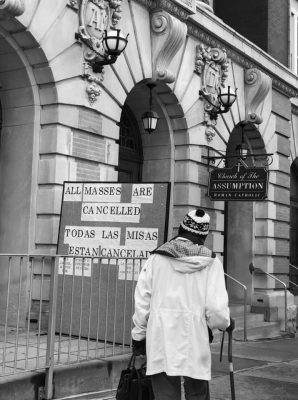Clergy Connects With Congregations Despite Empty Pews

It’s almost unthinkable that a priest or minister would be alone in a church on Palm Sunday and Easter morning.
But that’s what scores of clergy members across the area and thousands more around the United States are facing the next two Sundays, and who knows how many more Sundays after that.
The health catastrophe that is the coronavirus has turned nearly everyone’s life upside down and that includes communities’ religious leaders, where holidays and services are meant to be celebrated together.
“It is sad that people won’t come together, but given what’s going on in the world right now, I think people are starting to realize we will do what we can and do what we have to in order to keep that social distance and everything, and we look forward and pray for the time when everything will be better and we can come back together again,” said Msgr. Joseph Giandurco, a priest at St. Patrick’s Church in Yorktown.
Most congregations are adapting as best they can, with churches and many synagogues resorting to the next best thing in the 21st century – live streaming their services.
Rev. Nils Chittenden, who leads St. Stephen’s Episcopal Church in Armonk, has been making use of the technology the past two weekends. It’s a good substitute considering the circumstances, but it can’t fully replace having parishioners in the pews.
Some of his congregants have told Chittenden they not only miss the fellowship but receiving the sacraments. But there are many others have enjoyed the chance to tune in from home.
“I think people are really looking forward to getting back and it has been very hard not to be able to hold services,” Chittenden said. “We’re holding live streaming of services and they are, for what they are, really good. From my end, it’s taking a service to an empty church, essentially. People have said how much they really appreciate it.”
First Presbyterian Church of Yorktown is one of the congregations where clergy have become creative. In addition to live streaming on the church’s website, which the church has done for the past 18 months, this Friday from 3 to 5 p.m. and Saturday from 9 to 11 a.m., congregants will pick up their palms and communion in a drive-through in the parking lot, said co-pastors Chip Low and Tami Seidel.
Giandurco said last weekend that St. Patrick’s had a highly successful drive-through confession where about 60 cars over an hour and a half, made use of the makeshift arrangement.
Another idea, which First Presbyterian borrowed from a priest, was to encourage parishioners to send them photos of themselves. Low and Seidel put the photos in the pews, so they would see faces when leading the service in an empty sanctuary.
Congregants have also split up the list of members and each called about six or eight of them to check on how they’re doing.
“It’s disappointing,” Low said. “This is not what we wanted but one of the things I’m really proud of in this, you figure out how to adapt. So our people see and can connect to us in these special holy days in a way that we’re still present together in some way.”
In addition to the virtual services online, First Congregational Church of Chappaqua continues to find ways to help those who need assistance, said Rev. Dr. Martha Jacobs. A group of parishioners have taken to making surgical masks, which will be sterilized and delivered to healthcare work. The community can also come by the church and drop off non-perishable food that will be delivered to the Community Center of Northern Westchester’s pantry.
However, not everyone can avail themselves of the latest technology. While many Reform synagogues are also live streaming services, Rabbi Yehuda Heber of Chabad of Yorktown said Orthodox Jews are unable to use electronics on the Sabbath and holidays. Heber said Chabad’s religious school classes are employing that for remote learning.
“If this is the way God works, then this is the way it was meant to be,” Heber said. “It’s not comfortable, yes, it’s frustrating, but if that’s the way it is, then that’s the way God wants it, and that’s the way we serve him.”
Jacobs said the situation is forcing her and other clergy to rethink how they reach their congregations by getting them out of their comfort zones.
“We have to think of different ways to be together while apart,” she said.

Martin has more than 30 years experience covering local news in Westchester and Putnam counties, including a frequent focus on zoning and planning issues. He has been editor-in-chief of The Examiner since its inception in 2007. Read more from Martin’s editor-author bio here. Read Martin’s archived work here: https://www.theexaminernews.com/author/martin-wilbur2007/
